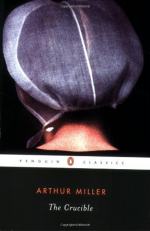|
This section contains 626 words (approx. 3 pages at 300 words per page) |

|
Good and Evil in "The Crucible"
Summary: An analysis of the idea presented by Arthur Miller in his play "The Crucible" that good and evil are relative, and that only individuals can judge themselves, not society. This idea is important to one's understanding of the play itself.
In "The Crucible", Arthur Miller asserts that good and evil are relative. In other words, concluding whether something or someone is good or evil depends upon certain circumstances. From this he conceives that only individuals can judge themselves on whether they are good evil -- not society. I also believe good and evil are relative and that only individuals can judge themselves. Moreover, I believe that the way we as humans judge one another originates from what society has said is good or bad. Without society, there would be no basis for judgment.
Miller's view, that good and evil are relative, is decisively portrayed in "The Crucible." From Danforth's standpoint in the story, Proctor and the rest of the accused look like servants of the Devil. This is because the truth, that Abigail's accusations are false, is so craftily hidden that Danforth only sees evil from them. But...
|
This section contains 626 words (approx. 3 pages at 300 words per page) |

|


